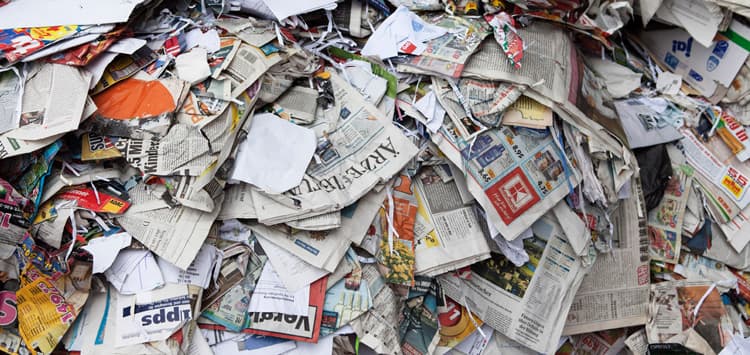
Paper Waste
Paper is often seen as one of the Earth’s truly renewable resources, but is there more we can be doing in practice to act more sustainably?
Sustainable Paper
When using paper in practice, there are two significant things to keep in mind. Firstly, has your paper been Forest Stewardship Council (FSC) certified? The FSC is a not-for-profit organisation which promotes the responsible management of the world’s forests. The FSC also aim to avoid, repair or mitigate any negative environmental impacts. Purchasing your paper from FSC certified sources ensures that your paper has been sustainably made.
The second thing to ask when purchasing paper is: is it made from recycled materials? Recycled paper will use less energy, less water and produce less carbon emissions than manufacturing virgin paper. Using recycled paper products also means less deforestation (due to less demand for wood), less habitat loss and more oxygen kept in the atmosphere. Additionally, it will considerably reduce the amount of paper sent to landfills.
Make the most of technology
Now you have your eco-friendly paper, it’s time to start reducing it! Although it has been sustainably sourced, that does not mean we can lose respect for the amount of energy and resources that went in to producing it. It’s vital that we remember the bigger picture.
One of the easiest ways to reduce your usage in practice is to default all your printers to double-sided printing. For less important documents, you can also use narrower margins and use single-spacing. You may also want to look at reducing the amount of documents you fax from your practice and see if they could be emailed instead. If faxing is the best option, why not eliminate your cover sheet? Over time, all of these seemingly small actions will begin to add up.

Think before you print
Imagine how many documents your practice prints each day. How many of those could be emailed instead (or don’t even need to be printed in the first place)? I’m talking about things like patient histories, insurance claims, invoices, estimates, receipts and lab results. Even pre and post-op information sheets can be emailed to clients instead of handing out physical copies. For example, I have previously implemented a protocol where post-op instructions were emailed to clients before their discharge appointment, along with a photo of their pet recovering – clients loved it! Of course this won’t work for every client but it’s all about finding a balance and seeing what works best for your practice.
Reduce and Reuse
Now we have our paper usage sorted, it’s time to think about reducing the amount of paper products coming in to the practice. You may want to think about eliminating unnecessary subscriptions (does every staff member need a copy of the same magazine?), try online catalogues instead of physical copies or look in to changing your practice bills to paperless versions. Have a discussion with your suppliers and see what options they have available to you. For example, some companies will let you return packaging to them to be reused.
Once the paper in your practice has served its original purpose, ask yourself if it could then be reused for something else? Scrap paper can be used as cheap notepads or cardboard boxes can be used for inpatients to hide in. If you are inundated with boxes, why not ask your local community if anyone could use them for a house move?
.jpg)
Responsible Recycling
When your paper has reached the end of its life cycle and can no longer be reused, it’s time to recycle it. There is often little need for paper to end up in landfill (where it will take years to breakdown, producing methane as it does). To ensure your paper is recycled properly and to stop it ending up in the general waste bins, it is vital that recycling is made easy and convenient for your staff. Make sure you have multiple recycling bins placed around your practice and find out what your local council will and won’t accept. Get your staff involved and motivated!
Did you know?
Did you know that some local district councils will not accept shredded paper for recycling? If you find that yours doesn’t accept it, don’t worry as there are a few alternatives available! Initially, you need to ensure that only necessary documents are being shredded, the rest can be recycled as whole sheets. Once you have your shredded paper, you can reuse it as inpatient bedding, reuse it as packaging material or even compost it at home! Nevertheless, your practice may find it easier to source an external company to shred and recycle your documents for you. Whatever you do, just don’t send it to landfill, there is absolutely no need!
Written by Merryn Wymes RVN DipFN
